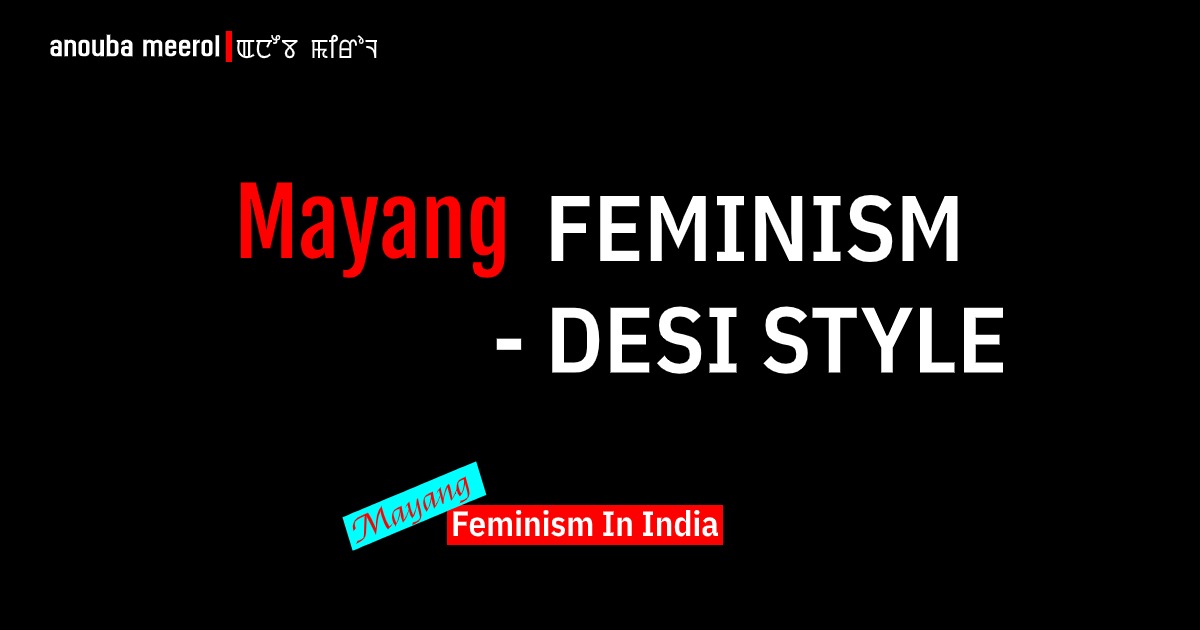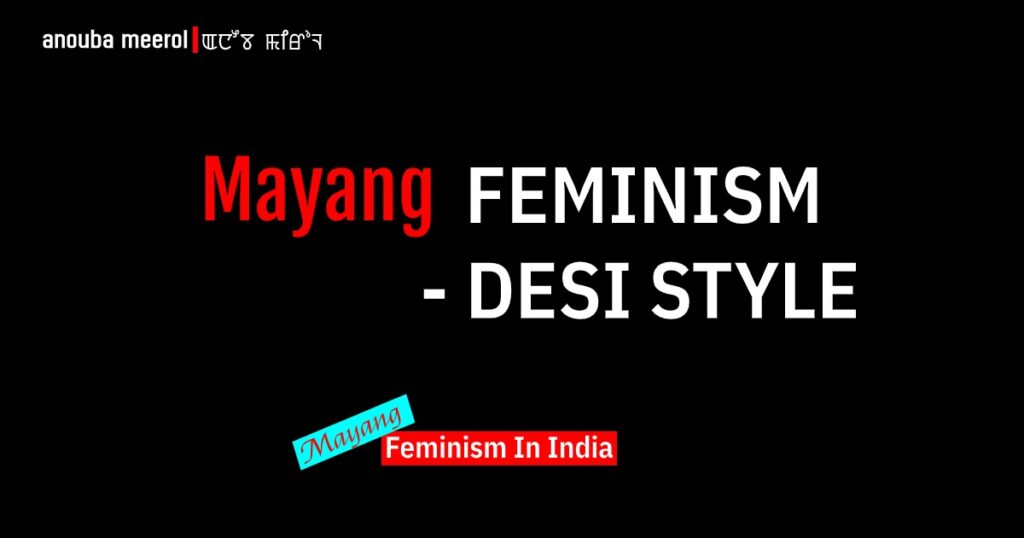
Cases of everyday racism against people of “northeast” have become more gruesomely prominent because of the coronavirus pandemic. In this regard, Feminism in India – an intersectional feminist digital platform – has spoken up. In their desire for a brownie point, they have published one article and completed their task of being an ally. Having said that, let us break down what they have said recently and understand where they stand in the anti-racism discourse.
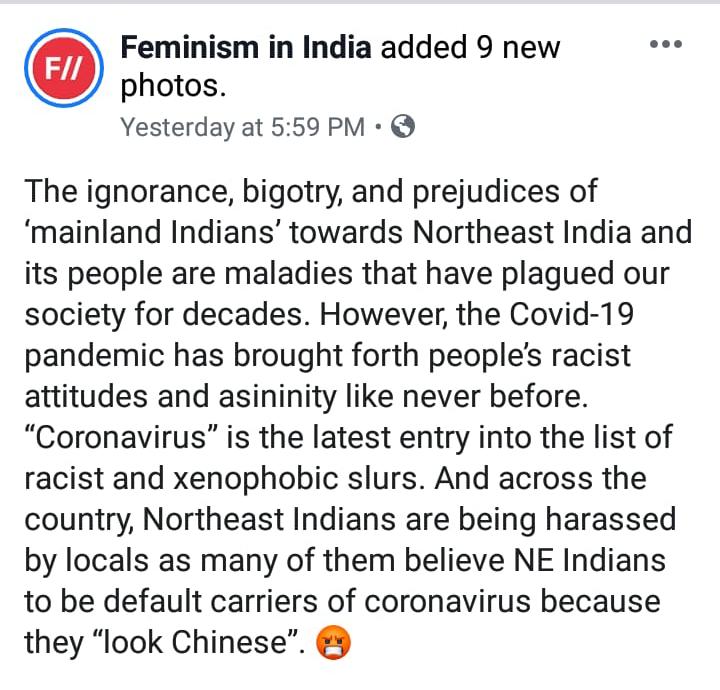
The ignorance, bigotry, and prejudices of ‘mainland Indians’ towards Northeast India and its people.
The very sentence starts with mayang fragility. You know it right off the bat when the mayang don’t want to use the R-word, instead, they refer to it as mere “ignorance”. They call it everything but racism. It’s an age-old tactic, a pattern that exposes their fragility. Fragility is their incapacity to hold themselves accountable for the racism they have been perpetrating towards us.
…are maladies that have plagued our society for decades.
Whose society are they even talking about? It seems like their concern is more of their society. The portrayal of racism to be plaguing the Indian society is an act of denial that racism is inherent in their society and inseparably interwoven. It is, well, over seventy years that we have been suffering every day at home and in mainland India.
However, the Covid-19 pandemic has brought forth people’s racist attitudes and asininity like never before.
Blaming their racism on Covid-19 and pretending as if racism is a thing of the past determines how much they underplay and disregard the issue of racism. Covid-19 just happens to magnify the extent of racism, not allowing the mayang to turn away and ignore it like they have been doing all this while. On top of it, “like never before” is a manipulative way of reducing all the violent racist attacks in the past to nothing. Do we need to remind them of the murder of Richard Loitam and Nido Taniam, to name a few victims of racism in mainland India? Back home, it’s worse. The number of rape and murder as a result of militarised racism in this region tells a horrific history of violence and oppression that still prevails. BSF officers raped Miss Rose Ningshen (1974) and she committed suicide two days later [1]. Two army officers attempted to rape Miss Luingamla Muinao (1986), and when she resisted, she was shot dead [2]. Two Indian army personnel raped Elangbam ongbi Ahanjaobi (1996) in front of her 12 years old disabled son [3]. Two 12 Grenadiers personnel raped 15 years old Nandeibam Sanjita (2003) at gun point, which led to her committing suicide [4]. The gruesome incident of 12th Assam Rifles’ brutality in the case of Thangjam Manorama (2004) needs no reminder. These are a few reported cases from Manipur alone.
The reported case of alleged 1,528 extra-judicial killings by the Army and other security forces in Manipur still has its horrifying impact lingering around [5]. “Like never before” is a display of their inherent racist attitude that neglects the atrocities of militarised racism. It does not come as a surprise because, recently, they have published an article, titled SC Busts Gender Stereotypes in Indian Army: A Feminist Victory [6].
Another major incident is the sudden exodus of “northeast” people from Bangalore in 2012, instilling a great sense of fear and panic [7].
Feminism in India writes “a few basic pointers one should already know” in their post.
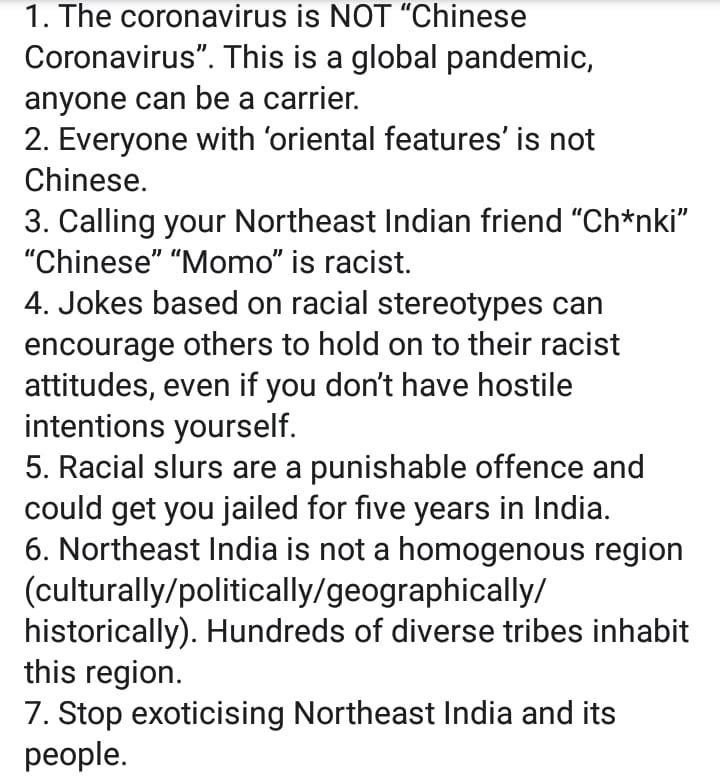
3. Calling your Northeast Indian friend “Ch*nki” “Chinese” “Momo” is racist.
Calling ANYONE with mongoloid features Chinki, Chinese, Momo is racist, even if they are not your friends. It’s not just about morality. Such oppressive language is violent; it denies people access to spaces, knowledge, food (especially at a time of coronavirus lockdown), and other basic necessities. It also takes a massive toll on someone’s mental health, pushing them to the margin and inflicting a sense of fear and inferiority. It is nothing but a violent form of keeping the marginalised section suppressed.
4. Jokes based on racial stereotypes can encourage others to hold on to their racist attitudes, even if you don’t have hostile intentions yourself.
Jokes are in themselves hostile. The question is not about intention, it is about action. Qualifying here that “even if you don’t have hostile intentions” is something not worth stating. But, stating such a thing is an attempt to highlight that the racist lot are ignorant too. It is covering up the act of racism, giving it the excuse of ignorance.This is unacceptable.
5. Racial slurs are a punishable offence and could get you jailed for five years in India.
The question here is not about if any racial slur is a punishable offence or not. The question is, is there any racial law implemented and how effective it is, if there is any. Moreover, neither has it reduced racial attacks nor has it changed racist attitudes. When the system itself is racist, how can one expect to have laws for protection from racism.
6. Northeast India is not a homogenous region (culturally/ politically/ geographically/ historically). Hundreds of diverse tribes inhabit this region.
“Northeast” is in itself a term of British colonial set-up that centres Bengal [8]. Acknowledging the non-homogeneity of the region is a good thing to be aware of. But it does not serve any purpose in tackling mayang racism. Instead, many a time, we have seen mayangs and their racism apologists bring up the differences and conflicts in the northeast region and weaponize it to excuse their racism against northeast people. Thus, this knowledge does more harm than good.
Further, it writes:
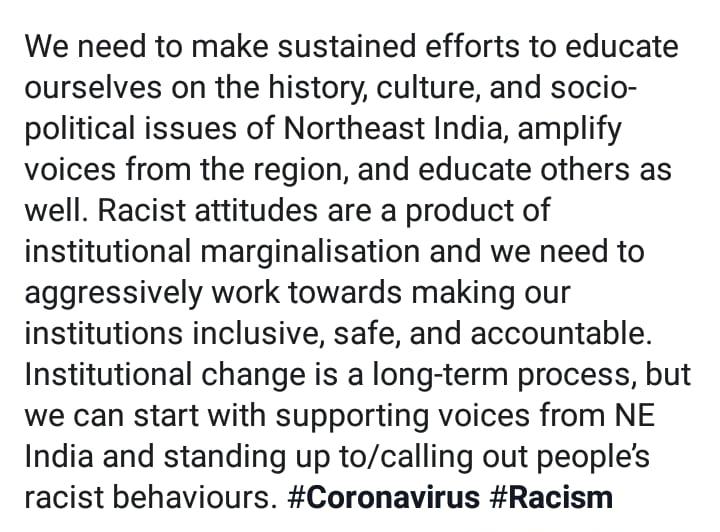
…We need to make sustained efforts to educate ourselves on the history, culture, and socio-political issues of Northeast India.
“Educating” is not enough. Be anti-racist. Challenge the racist status-quo of your institutional set-up. Also, educating yourself for the sake of education using Indian narrative is of no help. It has, instead, erased us of our own indigenous identity. Listen to the indigenous people.
…amplify voices from the region, and educate others as well.
While these mayang feminists talk about “amplifying voices,” what they actually do is either appropriate or hijack or silence the marginalised voices. A very important point that needs highlighting is that when the CAB movement started in February, 2019, it was only the northeast out on the streets and it was burning. During this same time, the mainland paid no heed to it except for taking on some Twitter trend with some hashtag. When the CAA movement picked up in mainland India, Feminism in India jumped on the bandwagon of portraying mayang women as the champions of the CAA movement while completely erasing the struggle and fights of the indigenous people of the northeast. In one of their posts highlighting protest sites, they completely left out the northeast spaces. When questioned, their response was that there weren’t enough sources and they were actively looking for information. It was a surprise because any of the sources was just a google search away.
They also have endorsed The Mothers of Manipur by Teresa Rehman – a book which people of Manipur have denounced for various reasons [9]. But these mayang feminists will support it.
…Racist attitudes are a product of institutional marginalisation and we need to aggressively work towards making our institutions inclusive, safe, and accountable.
“Inclusivity” is in itself oppressive in a capitalist mayang colonial system. It only ends up in being performative and tokenizing indigenous chinkies. Why is there such a focus on inclusion ? The question they should explore, which is fundamental, is how did different parts of this region get included in this country.
…Institutional change is a long-term process, but we can start with supporting voices from NE India and standing up to/calling out people’s racist behaviours.
Again, changing individual behaviours alone is less helpful in ending racism till the existence of the racist system. Further, “supporting voices from NE India and standing up to/calling out people’s racist behaviours,” given their understanding of racism, as we have seen till now, only stinks of saviour complex. It sounds so superficial when they talk about calling out people’s racist behaviour with their understanding of racism. Our quest is about standing up for ourselves.
As mentioned above, Feminism In India supports Indian military and claims its inclusion of women as “feminist victory” [6]. We needn’t even get into feminist theories and analysis of military as a site of overt hyper-masculinity and aggression. They are celebrating the commanding roles of women in Indian army to subdue and control, to kill people without guilt as a feminist move. It clearly tells you that Feminism In India has a very superficial approach when it comes to gender equality. On one hand, they speak of intersectionality, solidarity and amplification of marginalised voices, and on the other hand, they support the racist, misogynist institution that murders, rapes, and exploits people of “northeast” and Jammu & Kashmir. If it serves them, they support the very hyper-masculine, patriarchal institution which has subjugated the entire populations of the Northeast and J&K, and still rides on the back of the marginalised voice to give relevance to their politics of gender equality. Recently, there was an incident of Assam Rifles personnel sexually assaulting a woman in Manipur [10]. The security forces involved were two men and two women. It is evident that Feminism in India, doesn’t believe in and want liberation of all women. They want gender equality for a selective few in the existing system, having the same power like their male counterparts that uses violence to intimidate people into obedience and subjugate them.
With such continuous patterns, it should not be difficult for anyone to see the racism and racist institutions that even this “intersectional” mayang feminist organisation upholds.
References:
- http://e-pao.net/GP.asp?src=1..130517.may17
- https://www.imphaltimes.com/it-articles/item/6783-human-rights-issues-in-manipur-and-participation-of-tangkhul-women-3
- http://books.e-pao.net/Heritage_Manipur/epShowChapter.asp?src=Role_of_Women/Meira_Paibi
- https://timesofindia.indiatimes.com/india/Report-confirms-rape-by-another-jawan/articleshow/993207.cms
- https://scroll.in/latest/843775/manipur-encounter-deaths-sc-orders-cbi-investigation-into-alleged-extra-judicial-killings
- https://feminisminindia.com/2020/03/19/supreme-court-busts-gender-stereotypes-indian-army-feminist-victory/
- https://www.indiatoday.in/magazine/nation/story/20120827-people-from-north-east-flee-bangalore-racial-attacks-759475-1999-11-30
- https://journals.sagepub.com/doi/pdf/10.1177/2348448918759869
- http://www.raiot.in/reading-and-misreading-mothers-of-manipur/
- https://ifp.co.in/civil-bodies-condemn-alleged-sexual-assault-by-ar-personnel/
